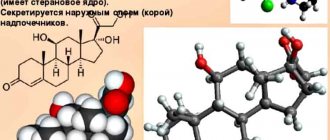It is no secret that the emotional and physical state of the human body is regulated by a complex mechanism of interaction between various biological factors. One of the most important “control levers” is considered to be hormonal levels - a harmonious combination of derivatives of the endocrine glands.
Even a small quantitative deviation of one of the components can significantly affect the overall health. The modern rhythm of life often makes us think about the question: “How to lower cortisol?” - one of the most “capricious” components of hormonal levels.
Cortisol, better known as cortisol, is a product of the activity of the adrenal glands, which begin to produce it in response to external stimuli. An adrenaline rush during times of great excitement or critical danger is a consequence of a strong increase.
In stressful situations, a temporary release of large amounts of hormones optimizes memory, blood pressure levels and response. However, if cortisol levels are constantly elevated, this greatly depletes the body.
Elevated levels of cortisol in the blood are not natural unless accompanied by severe stress, danger, or excitement. In the situations described, the surge of the stress hormone is isolated and temporary. There are several reasons that can directly or indirectly contribute to the creation of constantly elevated levels of cortisol in the blood.
- Chronic stress. Stress causes the body to intensively produce hormones to access additional resources. Constant stress creates chronically elevated levels of cortisol in the blood.
- Hunger. A lack of glucose in the blood inevitably causes a release of cortisol, which is especially pronounced during fasting or a strict diet.
- Coffee. Caffeine increases cortisol levels in the blood by thirty percent for several hours. Chronic coffee consumption also causes chronically high levels of the stress hormone.
- Physical exercise. Any physical activity on the body is a stressful state, in response to which the body produces a stress hormone. The stronger and longer the load, the higher the level of cortisol in the blood.
Each of these reasons, or their combination, to one degree or another contributes to the development of the disease, but this is not a reason to completely exclude them.
In this case, it means excessive passion or permanent exposure to the factors described above. Remember that everything is good in moderation.
Signs of excess cortisol
Before sounding the alarm about an excess of stress hormone in the body, it is first necessary to correctly diagnose the disorder. Only a qualified specialist can detect elevated levels of cortisol in the blood after conducting a series of detailed tests.
At home, you can pay attention to a number of symptoms that do not necessarily indicate an increased level of stress hormone, but should serve as a reason for testing and consultation with a doctor.
- Uncontrolled weight gain. If you carefully monitor calories and the amount of food you eat, adhere to the rules of a healthy diet, and the volume of adipose tissue continues to grow inexorably, then there is a high probability of having elevated levels of cortisol in the blood.
- Unreasonable nervousness. Periods of bad mood are common to everyone, however, involuntary breakdowns on others should give you pause. Cortisol is responsible for the functioning of almost all of the body's reactions to nervous tension.
- Cardiopalmus. Increased amounts of cortisol in the blood cause blood vessels to constrict, which increases the heart rate and pulse rate. If regular heart rate measurements show an overestimated value, then the cause may be an excess of stress hormone.
- State of depression and insomnia. If cortisol levels are elevated, the development of depression and, as a result, worsening sleep are quite natural consequences. The stress hormone owes its middle name to this feature;
- Decreased libido. A characteristic consequence of excess stress hormone is a sharp decline in libido/potency.
- Disruption of the gastrointestinal tract. in the blood has a negative effect on the process of digesting food, which is fraught with consequences such as colitis, bloating, etc.
- Frequent urge to urinate and sweating.
It should be noted that even full compliance of the symptoms described above with the picture of your well-being should not be a reason for aggressive self-medication. The probability is quite high, but manipulations without the approval of the attending physician can lead to disastrous results.
Proper nutrition
Poor nutrition is one of the causes of hormonal disorders. There are foods whose constant consumption leads to an increase in cortisol levels in the blood:
- Sweet confectionery pastries, candies, white bread, “fast” food are sources of fast carbohydrates.
- Coffee, green tea, energy drinks are high in caffeine.
Sea fish dishes, fresh vegetables and fruits, and cereals help maintain normal hormone levels. It is necessary to pay attention to the amount of clean water consumed. Its lack is perceived as stress , so adequate drinking is a prerequisite for stabilizing hormone levels.
You can regulate the level of the substance using folk remedies:
- Rhodiola rosea, St. John's wort, Eleutherococcus. Increases stress resistance and supports the functioning of the adrenal glands.
- Licorice. Regulates adrenal production and helps actively reduce hormone levels.
- Ginkgo biloba. Slowly reduces cortisol levels. To achieve the effect, you need to take it for six months.
Taking medicinal tinctures and decoctions should be coordinated with your doctor.
How to reduce hormone levels
If you are finally convinced of the presence of this disease, then it’s time to think about how you can reduce cortisol levels? After the examination, the attending physician will describe in detail the stages of treatment to normalize hormonal levels.
In addition, there are a number of fairly simple manipulations that can also significantly reduce the level of stress hormone in the blood.
- Good mood. Positive emotions and laughter are one of the simplest and at the same time effective means for treating excess cortisol, as they can significantly reduce its level in the blood without drug intervention.
- Proper nutrition. To treat excess cortisol in the blood, a special diet is used, which involves consuming foods with a low glycemic index, an abundance of healthy fats and a complete absence of alcohol, coffee and other stimulants. Consuming fish oil can also reduce stress hormone levels.
- Calm. In the treatment of elevated levels of the stress hormone, the patient’s ability to avoid stressful situations, which are the main cause of a sharp release of cortisol, is of great importance. To do this, it is quite enough to simply be less nervous.
- Limitations on physical activity. The duration of aggressive training and heavy physical labor should be reduced to one hour per day. This makes it possible to partially reduce the critical level of the stress hormone in chronic conditions.
To lower cortisol levels, you need to clear your life of all kinds of stress and start eating right. This is not a treatment as such, but only then can one think about the appropriateness of drug intervention. Partial, and in some cases, complete healing from this disease is in your hands.
And about how we reduce cortisol levels.
It performs very important and even vital functions in our body.
Although chronically elevated levels can significantly impact quality of life and be a major cause of poor health, cortisol also helps maintain homeostasis in the body and ensure normal functioning.
How does cortisol work?
Cortisol, like many other hormones in our body, is produced in the adrenal glands by their cortex.
When we experience stress, the hypothalamus tells the pituitary gland to release a special hormone to stimulate the adrenal cortex to produce cortisol.
When enough stress hormone is released, the two mentioned brain structures become silent, the cortisol level gradually decreases and returns to normal. This is an ideal scenario that doesn't happen very often in real life. In the hustle and bustle of everyday life, we are almost constantly in a state of stress; accordingly, a lot of cortisol is released and the body gets used to the fact that it now needs more of the hormone to overcome the same problems. This creates an imbalance in the entire hormonal system
, because the failure of one hormone inevitably leads to the failure of others. To complicate the issue, cortisol levels are also affected by conditions such as hypothyroidism, obesity, type 2 diabetes, and elevated estrogen levels.
Important properties of the stress hormone
In addition to the function obvious from its name, the stress hormone cortisol also has a number of other beneficial properties:
- stimulates the liver, promoting the processing of amino acids into glucose;
- improves the metabolism of fatty acids in the body;
- helps in the fight against inflammation and allergies;
- prevents the loss of sodium, which is important for health, in urine;
- Helps you stay calm and focus.
The lowest level of this hormone is observed in the evening hours, and the highest in the morning (more about the cortisol curve). With the sleep hormone melatonin, the situation is the opposite: when you wake up, its level is minimal, and then during the day it increases at the same rate as cortisol levels decrease. These two hormones, acting in opposite directions, maintain the natural rhythm of sleep and wakefulness to maintain homeostasis.
What does imbalance lead to?
In the absence of any disease, normal cortisol levels ensure the maintenance of optimal health. If the level is too low or high, disturbances are observed in many areas of life:
- body weight increases;
- libido decreases;
- persistent tension headaches appear;
- anxiety arises and depression develops;
- the level of vital energy decreases;
- problems with sleep appear;
- the menstrual cycle is disrupted;
- possible development of infertility;
- blood sugar levels chronically increase;
- problems with the intestines appear;
- the risk of developing osteoporosis becomes high;
- the cardiovascular system suffers.
This hormone is a major participant in the body's "fight or flight" response.
which was especially relevant and necessary in the distant past to save people from a real physical threat to life.
Today, such situations are extremely rare, but the structure of our body has remained the same and now we react in a similar way to less life-threatening situations such as diseases, chronic lack of sleep, strict diets, suppressed emotions, environmental pollution, etc. Such situations arise everywhere and force us to remain in a state of stress for a long time, which means that cortisol production becomes chronically high. Thus, we are almost always in “fight or flight” mode,
which causes us to reduce the importance of other important functions of the body: reproduction, digestion and relaxation.
For chronically elevated cortisol levels
- Serious disturbances in the functioning of the thyroid gland
occur . - When the stress hormone rises
, it stimulates the production of insulin, which in turn increases appetite. Particularly cravings arise for carbohydrate and fatty foods, which is reflected in an increase in body weight, and the abdominal area is most susceptible to the deposition of excess fat. - This whole process resembles a vicious circle, since due to increased body weight, estrogen levels may increase
- which, in turn, provokes excess weight gain due to disturbances in the thyroid gland, increased insulin production and decreased sensitivity to leptin
.
Determine and reduce cortisol levels
You need to take a test to determine cortisol levels at different times of the day, taking into account the natural fluctuations of the hormone and identifying the real dynamics of its changes. Tests can be carried out in different ways, by donating blood, urine or saliva, and thus determining the very fact of cortisol imbalance and the degree of its complexity.
You can reduce the level of the hormone cortisol with the help of these useful supplements:
- Magnesium. It is known for its calming properties, reduces adrenal sensitivity and is involved in more than 300 reactions in the human body. This mineral is useful for all people to take from time to time, and not just those who have problems with cortisol balance, especially since magnesium deficiency is observed in the majority of the world's population. The most acceptable form is magnesium glycinate, since glycine acts as a sedative, has high bioavailability and minimal side effects.
- Holy basil is an excellent natural adaptogen that helps normalize thyroid function and promote a healthy response to stress.
- B vitamins, especially B12, B9 and B6, help in modeling the correct response to stress and directly affect the levels of neurotransmitters in the brain.
During stressful situations, the body loses large amounts of magnesium and vitamin B through urine, so replenishing these substances in such a chronic condition is mandatory.
Changing your lifestyle is the key to success
Taking a variety of supplements is always beneficial for the body, but it can in no way replace the positive effect on the hormonal system that comes after changes in lifestyle. This will take quite a long time, because the cortisol level did not rise to a chronically high level in one day. If you follow these important, but not at all complicated rules in everyday life, you can eventually get rid of problems associated with high levels of stress hormone:
- Try to go to bed between 22:30 and 23:00, this will help reduce cortisol and increase melatonin to optimal levels, so you will sleep long and soundly.
- By sleeping at least 7.5 to 9 hours a day, you will help your body cope with excess weight, while improving the response of the hormone leptin, which is also associated with cortisol.
- A balanced diet with plenty of vegetables, fruits, healthy fats like avocados, fiber, chia seeds, and protein from any source will help provide the body with the nutrients it needs to fully repair processes affected by increased cortisol.
- Take warm baths with Epsom salts and lavender essential oil to enrich your body with magnesium and leave you feeling calm and relaxed.
- Learn stress management techniques and try to reduce your caffeine intake.
- Get regular exercise, such as yoga, stretching, or tai chi.
Work on normalizing the level of cortisol in the blood is quite long and painstaking, and is primarily based on identifying the main cause of hormonal imbalance. Remember that it is impossible to isolate yourself from stressful situations, but you can learn to manage them effectively and deal with your emotions constructively, thereby making a significant contribution to your good health and well-being.
Beauty and radiance to everyone! And take care of yourself.
Stress and the level of the hormone cortisol are two inseparable concepts. Below we will tell you 8 ways to lower cortisol and cope with stress yourself with the help of proper hormone function.
Cortisol isn't always a bad thing. This stress hormone helps the immune system during a sudden crisis, be it a physical attack or an emotional setback. Cortisol will help you tap into energy reserves and increase your ability to fight infection.
The problem is that constant stress keeps the survival mechanism constantly turned on, undermining the proper functioning of hormones. Chronically high cortisol levels can cause sleep problems, suppressed immunity, abnormal amounts of blood sugar, and even weight gain.
“When there is a lot of cortisol, it tells the body to eat something high in calories. This is a survival tactic. If you need to escape from a predator, you also need a lot of energy. But in the modern world, you don't need to survive, so cortisol should always be normal, says biochemist Sean Talbott, Ph.D.
Luckily, there is an antidote to high cortisol: relaxation. Here are eight surprising ways to help manage stress and, in some cases, cut your cortisol levels by almost half.
To Reduce Cortisol by 20%... Say "Om"
People who practice Buddhist meditation have significantly lower cortisol levels and stable blood pressure. Likewise, participants who meditated every day for four months saw an average reduction in stress hormones of 20%. Scientists at Maharishi University came to these conclusions. While the cortisol level in the group where they did not meditate increased significantly. (Try these 8 simple meditations that will change your life).
To reduce cortisol by 66%... Listen to more music
Music has a calming effect on the brain, especially if you have been under a lot of stress. When a doctor at Osaka Medical Center in Japan played a tune to a group of patients undergoing colonoscopy, the subjects' cortisol levels decreased compared to those who had the same procedure in a quiet room. Even if you don't have a gastrointestinal test coming up anytime soon, you can reduce cortisol in other stressful situations. For example, if you need to attend an important dinner, then simply add background music - this will help calm you down. It is also advisable to listen to something soothing before bed, rather than watch TV.
To reduce cortisol by 50%... Go to bed early or take a nap
What is the difference between six hours of sleep and the required eight hours of sleep? “Fifty percent of the blood is cortisol,” Talbott says. When a group of pilots slept six hours or less over seven nights, their on-duty cortisol levels increased significantly and remained elevated for two days. Such studies were carried out at the German Institute of Aerospace Medicine. The recommended eight hours each night stops the body from working and gives it enough time to recover from daily stress. If you absolutely don’t have time to sleep, just take a nap during the day. Researchers at the University of Pennsylvania found that a midday nap reduces cortisol levels and helps you recover if you've lost needed hours of sleep at night.
To reduce cortisol by 47%... Drink some black tea
“A cup filled with fun” is what the British say about black tea. It is associated with comfort and tranquility. The British prefer to drink it in the afternoon. As it turns out, this has a scientific connection. When volunteers at University College London were given stressful tasks, those who regularly drank black tea had a 47% decrease in cortisol within an hour of the tasks. While those who drank fake tea reduced their stress levels by only 27%. Study author Andrew Steptoe, Ph.D., suspects that the chemicals polyphenols and flavonoids may be responsible for the calming effects of drinking tea.
To Reduce Cortisol by 39%... Take a Walk with a Fun Friend
A supportive friend who distracts you from your problems can help reduce your hormonal changes due to stress. “Just laugh a lot and it will reduce your cortisol levels by almost half,” advise researchers at Loma Linda University. If a funny friend can't get out to drink with you, you can achieve the same effect by watching funny comedy shows.
To reduce cortisol by 31%... Book a massage
Rest and massage will help reduce your stress levels. According to research from the University of Miami and the School of Medicine, after several weeks of massage, cortisol in subjects decreased on average by almost one third. It also helps keep cortisol levels within normal limits. Massage sessions reduce stress by stimulating areas that promote the production of serotonin and dopamine. These hormones help us feel good and free when we are spending time with friends or doing something fun.
To Reduce Cortisol by 25%... Do Something Spiritual
Religious rituals protect many people from everyday pressures and reduce cortisol production. Researchers at the University of Mississippi came to this result. Subjects who attended church had, on average, lower stress hormone levels than those who did not attend church at all. If religion doesn't interest you at all, try developing your spiritual side by walking through natural "cathedrals" - in the forest or along the beach. You can also do charity work.
To reduce cortisol by 12-16%... Chew gum
Next time you feel run down, try chewing gum. “It will relieve stress instantly,” says new data from Northumbria University in the UK. During times of stress, people who chewed gum had 12% less cortisol in their saliva than those who did not chew gum. The reason is that chewing gum increases blood flow and neural activity in certain parts of the brain.
Based on materials:
https://www.prevention.com/mind-body/how-lower-cortisol-manage-stress
Cortisol is a hormone secreted by the adrenal glands and is known as the “stress hormone.” Cortisol is different from other hormones in that it causes blood pressure and blood sugar levels to rise. Chronically high blood pressure can increase the risk of developing cardiovascular disease, diabetes and obesity.
Effectively managing stress, and therefore cortisol, will help avoid health complications and protect the immune system. Cortisol plays an important role in helping to release insulin and maintain glucose levels, so it is very important for each person to know what this hormone is and what remedies are available to restore its normal levels.
Main causes of pathology
This hormone is synthesized during the work of the pituitary gland, adrenal glands and hypothalamus:
- During moments of stress, the hypothalamus begins to produce coricotropin-releasing hormone (often called CRH);
- CRH stimulates the production of ardenocorticotropes (ACTH) in the pituitary gland;
- Hn stimulates the adrenal cortex, causing the synthesis of cortisol in it.
Cortisol, the deficiency of which can seriously affect your health, is produced at the very end of the hormone production chain. This means that its insufficient level can be caused both by problems of all three organs of synthesis, and by their incorrect interaction.
https://www.youtube.com/watch?v=subscribe_widget
Doctors identify several reasons for low levels:
- Addison's disease.
- Adrenal gland affected by tuberculosis.
- Congenital pathology of the adrenal cortex.
- Impact of external factors. Low cortisol can be caused by adrenal gland surgery or certain types of medications.
Stress is not the only cause of elevated cortisol in the blood. Increased cortisol concentrations in women are associated with:
- Fasting and addiction to various diets.
- Exhausting workouts.
- Abuse of coffee and caffeinated energy drinks.
- Lack of night sleep.
- Use of hormonal contraceptives, certain medications.
- Pregnancy and childbirth.
- Endocrine disorders.
- Malignant tumors.
- Alcoholism.
- AIDS.
In this list, only one reason is a physiological norm. A multiple increase in the concentration of the hormone occurs during pregnancy and during labor. In other cases, you should change your lifestyle or look for a disease that causes excessive cortisol secretion. Sometimes it is enough to reduce the frequency of stressful situations.
It is necessary to regulate the level of cortisol in the blood only after a comprehensive examination and prescription of appropriate medications by a doctor. All disorders that provoke the release of cortisol are divided into three groups:
- ACHT-dependent (ACHT is an adrenocorticotropic hormone secreted by the pituitary gland and directly affects the secretion of cortisol).
- AKGT independent.
- Functional.
It is impossible to diagnose the cause of the failure on your own. There are no universal medicines. Taking independently selected hormonal drugs is unacceptable. Effective reduction of cortisol depends on accurate diagnosis of the disease. The preparation of a set of measures should be supervised by the attending physician. He decides what methods to use to reduce cortisol levels.
Chronic high cortisol is a dangerous pathology. Excessive secretion of the adrenal glands leads to their exhaustion, general hormonal imbalance and the occurrence of diseases. The reasons for its stable high concentration may be different, but only a specialist should be involved in identifying and treating them.
2 methods: First method: Make changes to your diet Second method: Make changes to your lifestyle
Cortisol is a hormone produced by the adrenal glands in stressful situations. While cortisol is vital for some people, others produce too much of it. When this happens, you may notice feelings of anxiety, stress, and may even gain weight. It is important to take action as soon as you notice one or all of these symptoms.
- Reduce or eliminate your consumption of highly caffeinated drinks.
These include sweet soda water, energy drinks and coffee. Drinking caffeinated drinks causes a spike in cortisol levels. On the plus side, cortisol responses are reduced, but not eliminated, in people who regularly drink caffeinated beverages. - Reduce your consumption of processed foods.
Processed foods, especially simple carbohydrates and sugar, lead to a spike in cortisol.Eating too much of these foods increases your blood sugar levels, making you feel anxious.
- Try to avoid the following refined carbohydrates in your diet: White bread
Regular pasta (not whole grain)
- White rice
- Sweets, cakes, chocolate, etc.
- Drink enough water.
One study found that even half a liter of dehydration can increase cortisol levels.Dehydration is a vicious cycle: stress causes dehydration, and dehydration causes stress. Drink enough water throughout the day to reduce your chances of getting unhealthy levels of cortisol.
- If your urine is dark in color, it may be a sign that you are not drinking enough water. If there is a sufficient level of water in the body, the urine will be light in color, almost like water.
- If your cortisol levels are high, take Rhodiola rosea based medications. Rhodiola rosea is a herbaceous plant in the same family as ginseng and is a well-known folk remedy for lowering cortisol levels. It is said to revitalize you, help burn fat, and lower cortisol levels.
- Eat more fish oil.
According to doctors, taking 2 grams of fish oil per day will lower your cortisol levels.If you don't want to chew special supplements, you can eat the following types of fish for your required dose of fish oil:
- Salmon
Sardine
- Mackerel
- Sea bass
- Brew a pot of hot black tea.
Scientists have shown that drinking black tea lowers cortisol levels in a group of people performing stressful tasks.So the next time you feel your cortisol skyrocketing and threatening to unleash a wave of stress, drink a cup of black tea and calm down.
- Try meditating.
Meditation activates the vagus nerve, which, among other things, is responsible for your body's response to low cortisol levels.Taking deep breaths allows your mind to go to a calmer place. It is best to meditate for 30 minutes a day, three to four times a week. After your first meditation, you will notice a difference in how you feel.
- Sit in a quiet, dark room. Relax. If you find this difficult, imagine a quiet, peaceful place. Imagine your whole body relaxing and try to recreate this feeling yourself. This will help relieve muscle tension.
Close your eyes. Take a deep breath and exhale, over and over, until you notice your heart rate slowing down. Notice your heartbeat when you are relaxed. Imagine all the tension leaving your body through your fingertips and toes. Feel the tension leaving your body.
- Watch a funny movie or listen to a funny story. According to the American Association for Experimental Biology, joyful laughter may actually curb your body's production of cortisol. So chat with your funny friend or remember a funny story to reduce your cortisol levels.
- Perform special exercises aimed at lowering cortisol levels.
Exercise is a great stress reliever, isn't it? But does all exercise lower cortisol levels? Not really. The fact is that running and other exercises that increase your heart rate ultimately increase cortisol levels in your body.- Try yoga or Pilates as exercises that, in addition to lowering cortisol, also help burn calories and tone your muscles.
Try other exercises, such as using a Wii gaming console, to get your heart rate up without raising your cortisol levels.
- Listen to music.
Music therapy is known to reduce cortisol levels in patients undergoing colonoscopy.So the next time you're feeling low and down, put on some nice music and lower your cortisol levels.
There are several main reasons under the influence of which an increase in hormone levels can occur. A jump in the indicator negatively affects a person’s overall well-being. This condition can be caused by:
- starvation;
- constant stressful situations;
- excessive physical activity;
- coffee abuse.
Lack of proper nutrition leads to low blood sugar. It is this indicator that is responsible for the level of cortisol. However, fasting alone is not enough for the development of abnormalities. Usually this item interacts closely with others.
Constant stressful situations lower hormone levels. This happens due to the strong energy costs that the body undergoes. Constantly being in a tense state exhausts a person.
Excessive physical activity is considered a real stress for the body. The more intense the workout, the more the hormone levels begin to rise.
Coffee drinks affect cortisol, but the effect is temporary. Within a few hours the condition returns to normal.
Typically, surges in hormone levels occur due to the interaction of several factors. In this case, you can lower cortisol by eliminating provocateurs.
What is cortisol? What are the properties of this hormone?
The pituitary gland produces the hormone ACTH, which stimulates the adrenal glands to produce cortisol.
During stressful situations, cortisol is released in large quantities, which provokes an increase in blood pressure, memory function, but at the same time provides energy for physical activity and the ability to quickly respond to life-threatening events. The production of cortisol in optimal quantities has a positive effect on the body, but if the body is unable to control this process, then the situation may turn in the opposite direction. Producing too much cortisol can trigger the development of a number of chronic diseases, such as coronary heart disease, hypertension or obesity.
What do we have to do
I think after reading this article you will realize that eating large amounts of carbohydrates in the race for an ideal body or even just better health simply does not make sense. The main task should be competent manipulation of your insulin and cortisol levels.
I am in no way encouraging you to try the ketogenic diet or the Atkinson diet. My main recommendation is that you learn to monitor your carbohydrate sources (high and low glycemic) as well as your glycemic load (the amount of carbohydrate you eat per meal). If you are absolutely convinced that you need to take your carbs on schedule with each meal, try to take no more than 20-30g per sitting, which will keep your carb loading under control. In addition, save the intake of carbohydrates with a high glycemic index only during your workouts or any other physical activity. Give preference to carbohydrates with a low glycemic index, which in most cases are rich in fiber.
I would recommend consuming carbohydrates only before and after workouts, and making the rest of your meals based on high-quality protein sources and natural, non-processed fats.
For those looking to lose fat or gain muscle while maintaining low body fat, using supplements that increase growth hormone production and lower cortisol levels can help achieve the goal.
Related video: How to reduce cortisol levels:
Why are cortisol levels elevated in men and women?
Cortisol levels increase, as mentioned earlier, as a result of stress.
And it is very important in this case to understand that in rare stressful situations, when the body has the opportunity to recover, an increase in cortisol will not have a negative impact on health. If the body does not receive the desired rest and is constantly in a state of stress, cortisol can affect a person’s health in the most unpleasant way. As a rule, cortisol is elevated in the following diseases: Cushing's syndrome; adrenal tumor; syndrome of ectopic ACTH synthesis.
In the fair half of humanity, cortisol increases during pregnancy. Around the thirtieth week of pregnancy, the body begins to produce cortisol with a vengeance, since it is this hormone that is necessary for the production of sufractant in the fetus.
Symptoms
When danger arises, the nervous system automatically activates the hormonal system. In response, the adrenal glands produce cortisol, adrenaline and norepinephrine, which mobilize the human body for a quick response. His reaction speed increases, his ability to fight back the enemy or escape increases.
Cortisol in the human body is produced in accordance with daily or circadian rhythms. Normally, in the morning the amount of this hormone in the blood is increased, and in the evening it gradually decreases. In stressful situations, its level increases tens of times. Then, when the voltage subsides, its value returns to normal within 1 - 2 hours.
Symptoms of elevated cortisol levels include:
- anxiety, irritability, fatigue;
- increased appetite, weight gain, especially in the abdominal area;
- sleep disturbance;
- increased heart rate even at rest;
- high blood pressure;
- disruptions in the menstrual cycle in women, erectile dysfunction in men;
- the appearance of spots and stripes on the body;
- decreased immunity.
Cortisol has the property of accumulating in the body over a long period of time; this property manifests itself gradually. Increased levels of the hormone can be detected by the following signs:
- Changes in the patient's appearance - thinning of the limbs, rounding of the abdomen due to the formation of a layer in this area. Rounding of facial features, blurring of the chin, redness of the skin.
- Renal colic - develops against the background of organ failure.
- Frequent changes in emotional state, depression, anger, breakdowns.
- Long healing of wounds.
- Decreased sexual desire, impotence.
When the first signs of increased cortisol concentrations in the blood occur, it is recommended to seek medical help. A timely visit to an endocrinologist will help prevent negative consequences, since prolonged exposure to elevated cortisol levels is life-threatening.
Lack of the hormone can be caused by various reasons, but the symptoms of low cortisol are similar in almost all cases.
Addison's disease, tuberculosis and congenital pathologies cause suppression of adrenal function. This condition is characterized by the following symptoms:
- Fast fatiguability;
- Weakness;
- Apathy;
- Smooth weight loss.
Lack of cortisol in the chronic stage causes increased skin pigmentation. It is most noticeable in areas of contact with clothing or underwear, on the nipples, around the anus, on scars or scars. An abrupt increase in pigment indicates that the disease is progressing.
You can guess about a decrease in cortisol in the blood by a strong and gradual decrease in blood pressure. Dizziness, fainting, weight loss, abdominal pain of unknown origin also indicate a hormonal deficiency.
Patients are often misdiagnosed by a gastroenterologist. Such a patient can be treated for a long time for colitis or peptic ulcer, not knowing what the true cause of his condition is.
What is the normal cortisol level for men and women?
The level of cortisol in the blood of men and women is a very relative concept, and the value is not constant at all.
This is the uniqueness of this hormone - in the morning its content in the blood is maximum, during the day it gradually decreases, which continues until the evening, until it reaches a minimum level. Don’t forget that the amount of cortisol is influenced by many factors, ranging from physical activity to severe stress. Taking all this into account, the normal cortisol level in women is 140-600 nm/l. In representatives of the stronger half of humanity, the normal level of cortisol is practically the same - about 600 nmol/l.
When to lower cortisol
If a woman has a high level of stress hormone in her blood, it is necessary to undergo a comprehensive examination and do an additional clinical urine test. Not every such condition is associated with pathologies. Preventative measures will be enough to stabilize hormonal levels. The main reducing factor for hormone imbalances is proper rest and stress reduction .
When adrenal dysfunction is diagnosed in women, neoplasms are detected in the hypothalamic-pituitary system, and other pathologies, appropriate therapeutic measures are carried out. This is drug therapy or surgery.
Timely treatment is extremely important, since excessive load on the body of high cortisol leads to the development of diabetes, osteoporosis, heart and vascular diseases, weakened immune defense and other dangerous ailments.
How to reduce cortisol levels?
If the level of cortisol in the blood is consistently high, then it must be lowered to a reasonable minimum. You can do this in several ways:
Medications to reduce cortisol levels
As such, there are no standard and general medications to normalize cortisol levels in the body. Each case of an increase in this hormone is considered individually, after which drug treatment is prescribed by a professional based on the general indications of the patient’s health condition.
Drug hormone blockers
The most popular medications for treating high cortisol are hormonal blockers. Their action allows you to reduce the activity of the hormone or inhibit the secretion of the active substance. Typically, such drugs are used in sports, when the body needs to be restored after taking steroids.
Most often, blockers are medications for non-cortisol related diseases, and this is normal.
They are also used by people engaged in heavy physical labor. The most common drug blockers are sold in almost all pharmacies and are also actively advertised in the media.
But sometimes you should resort to less popular drugs:
| Product name | Country of manufacture or supplier |
| Omega-3 | Russia, but you can find foreign analogues |
| Clenbuterol | Bulgaria |
| Ketoconazole | Russia |
| Hmb | Great Britain, but there are analogues from the CIS |
| L-leucine | Great Britain, Russia, but there are analogues from the CIS |
| Relora | Distributed by the American company iHerb |
The manufacturers of these drugs say they have no side effects. But you should use these funds with caution. The fact is that they can provoke allergic reactions. Therefore, taking medications without a doctor's permission is dangerous. This can provoke pathological conditions or deterioration of hormonal balance.
Omega-3 capsules
Omega-3 acid is considered a building material for the brain, central nervous and endocrine systems. At the same time, it is part of cell membranes, reduces the risks of inflammatory processes, and regulates blood sugar levels. The substance also helps normalize cortisol levels in the blood and urine. It is important to remember its features:
- distributed in the form of capsules, packaged in plates or miniature glass and plastic jars;
- the average daily intake for adult women is 1-2.5 grams, adjustments are possible from the doctor;
- the exact cost depends on the place of production, but usually it starts from 542 rubles for a large package.
It should be described what, in addition to lowering cortisol, a lack of Omega-3 may pose. Most often, patients experience brittle nails, profuse skin rashes, peeling of the epithelium, hypertension, bowel problems and sudden mood swings. In excess, diarrhea, eating disorders and hypotension are noted.
Clenbuterol syrup
Clenbuterol is a bronchodilator drug that is prescribed for bronchial asthma or chronic obstructive pulmonary disease. It would seem that this medication is useless for women with elevated levels of cortisol in the blood. But one of the side effects of the drug is a decrease in the level of this hormone. Remember, that:
- the medicine is a syrup in a bottle of up to 100 milliliters;
- The standard prophylactic dose of Clenbuterol is 10 micrograms twice a day;
- the price for the drug varies in social and private pharmacies, usually it is 54-507 rubles.
Taking syrup leads to side effects - they are especially likely if the patient takes a full rather than a prophylactic dose. Most often, women experience mild tremors, anxiety, migraines, diarrhea, decreased blood pressure and irregular pulses. During the period of use, it is better to avoid physical activity.
The influence of intensity and duration of physical exercise[edit | edit code]
Short periods of physical exercise at an intensity of more than 60% V02max cause the secretion of ACTH and cortisol, the level of which is proportional to the intensity of exercise (Davies, Few, 1973; Howlctt, 1987; Luger et al., 1987; Kjaer M., et al., 1988; Deuster et al., 1989; Wittert et al., 1991). Even exercise lasting only 1 min at high intensity stimulates the secretion of ACTH and cortisol (Buono et al., 1986). Brief physical activity with submaximal load does not cause activation of the hypothalamic-pituitary-adrenal axis, even under conditions of extremely high temperatures (Kncfick et al., 1998). Exercising for 20 min at an intensity of 50% V02max does not cause an increase in cortisol levels, whereas the same exercise session at an exercise intensity of 70% V02max stimulates an increase in ACTH and cortisol levels (Luger et al., 1987). When study participants performed exercises at a stepwise intensity level, where the load increased every 10 min, starting at 40% of V02max, an increase in ACTH levels was observed only after the exercise intensity reached 80% of V02max (de Vries et al., 2000). After 1 hour of exercise on a bicycle ergometer with an intensity of 70% V02max, an increase in cortisol levels was observed compared to the resting state, however, further significant increases in arginine vasopressin, corticoliberin, ACTH and cortisol were observed only after a progressive increase in the Load every 10 minutes until the onset of fatigue (Inder et al., 1998a). When determining the level of cortisone in saliva, and not in blood plasma, its increase after exercise lasting 1 hour was observed only at an intensity of 76% V02peak, and was not detected at an exercise intensity of 45 and 62% V02peak, and with an exercise duration of 40 minutes, an increase in the content Salivary cortisol was not detected at any level of exercise intensity (Jacks et al., 2002).
These observations are best explained by data from studies where exercise was performed at intensities at or above anaerobic threshold. In particular, it has been shown that physical exercise at an intensity level below the individual TNA is not accompanied by activation of the hypothalamic-pituitary-adrenal axis (Kindcrmann et al., 1982; Gabriel et al., 1992). With a stepwise increase in the intensity of physical exercise, an increase in plasma levels of ACTH and β-endorphin is observed only after exceeding the individual anaerobic threshold (Schwarz and Kindermann, 1990).
Although several studies have failed to show an increase in cortisol levels in response to prolonged bouts of low-intensity exercise (Hoffman et al., 1994), ultra-distance running is associated with the same increase in cortisol levels as short repeated intervals. motor activity at higher intensity (Nagel et al., 1992). After completing a 100-km ultramarathon, cortisol levels are significantly higher than resting levels (Pestcli et al., 1989). A 75 km cross-country ski race also results in a significant increase in plasma cortisol levels (Vasankari et al., 1993). It has been suggested that activation of the hypothalamic-pituitary-adrenal axis during prolonged low-intensity physical activity is dependent on the development of a hypoglycemic state (Tabata et al., 1991). In 6 individuals who performed physical exercise at an intensity of 50% V02max for 14 hours, no changes in the levels of cortisol, ACTH and corticoliberin were observed when the blood glucose concentration was maintained at the initial level. The study authors suggested that there is a threshold plasma glucose concentration of <3.3 mmol (Tabata et al., 1991). In earlier work by the same group of researchers, stimulation of an increase in ACTH and cortisol levels during exercise on a bicycle ergometer with an intensity of 50% V02max for up to 3 hours or until fatigue was observed only in the late stages of exercise, when blood glucose levels decreased (Tabata et al. , 1990).
Class times[edit | edit code]
The response of the hypothalamic-pituitary-adrenal axis to certain stimuli may depend on the initial level of cortisol. For example, the increase in cortisol may be lower in the morning when basal levels are higher (DeChemey et al., 1985). It is assumed that this is due to the presence of a negative feedback circuit. One of the studies showed that despite the fact that the highest value of the initial plasma cortisol content and its maximum value after physical exercise is observed at 07.00 hours, the increase in cortisol levels compared to the control day was greatest when physical exercise was carried out at 24.00 hours (Kanaley et al., 2001). On the other hand, when comparing the area under the curve and resting circadian fluctuations in women who exercised at different times of day, no differences in changes in cortisol secretion were found (Thuma et al., 1995). When two identical exercise sessions were performed during the day, the changes in ACTH and cortisol secretion caused by the second session were more pronounced than the changes in the levels of these hormones after the first session or after a single session on a different day (Ronsen et al., 2001a). ).
Type of exercise[edit | edit code]
Unlike cycling at an intensity below the anaerobic threshold, squats and high-intensity interval cycling produce changes in cortisol levels (Vanhelder et al., 1985). Assessing changes in its level during rowing led to conflicting data. Despite a significant increase in plasma cortisol levels after rowing with maximum (7 min) and submaximal (40 min) loads on a rowing machine and after overcoming 8 x 2000 m on the water, demonstrated in one of the studies (Snegovskaya, Viru, 1993), Subsequent studies failed to show an increase in plasma cortisol in response to exercise on a rowing ergometer at maximum intensity until fatigue (Jurimac and Jurimae, 2001). Similar results were obtained when rowing at a lower intensity for 2 hours showed no fluctuations in plasma cortisol levels (Jurimae et al., 2001). An increase in cortisol levels was observed after kayak races of 19 and 42 km, but was greater after a longer distance race (Lutoslawska et al., 1991). Swimming sessions lasting 30 minutes cause an increase in plasma cortisol at elevated water temperatures, but not at 20°C (Deligiannis et al., 1993). Activation of the hypothalamic-pituitary-adrenal axis can be caused by both strength and endurance exercise. When comparing high (100% of individual maximum) and moderate (70% of individual maximum) intensity strength training exercises, greater increases in cortisol levels are observed at higher exercise intensities (Raastad et al., 2000). Performing three sets of strength training results in a greater increase in cortisol levels than performing one set (Gotshalk et al., 1997).
Age[edit | edit code]
In middle-aged men, after strength training consisting of sets of exercises “supine press”, “squats” and “leg press”, an increase in the concentration of cortisol in the blood plasma is observed (Hakkinen, Pakarinen, 1995). At the same time, such a reaction is not observed in women or older men. When comparing men of different ages, older people leading a sedentary lifestyle showed a decrease in basal cortisol levels, but at any age, in people with a high level of physical fitness, its content was increased (Silverman, Mazzeo, 1996). Regardless of the level of physical fitness, there is an age-related decrease in the magnitude of changes in cortisol levels in response to physical activity. When studying changes in its level in response to physical exercise with a submaximal load lasting 45 minutes in men, no age-related differences were found (Silverman, Mazzeo, 1996).
Gender[edit | edit code]
In women and men with the same body mass index (BMI) and physical fitness level, there was no difference in the magnitude of changes in cortisol levels after cycling at an intensity of 80% of the anaerobic threshold (approximately 50% VO,max) for 90 minutes (Davis et al. , 2000). Similar results were obtained when treadmill running for 30 minutes was used as physical activity (Kraemer RR et al., 1989). It was not possible to detect gender differences when analyzing changes in cortisol and ACTH levels either after running with a stepwise increasing load until fatigue, or after anaerobic training on a treadmill. Thus, both sexes show similar responses to aerobic endurance exercise. At the same time, after the administration of dexamethasone, changes in the levels of cortisol and arginine vasopressin in plasma in response to physical exercise with high intensity (90-100% y02max) in women were more pronounced, which may indicate a greater amplitude of changes in arginine vasopressin or reduced sensitivity of the negative feedback system to glucocorticoids (Dcuster et al., 1998). Black women have higher levels of ACTH secretion in response to exercise than white women, but the magnitude of changes in plasma cortisone levels does not differ between them (Yanovski et al., 2000).
Altitude above sea level[edit | edit code]
In comparative studies of the effects of exercise at different altitudes, an increase in plasma cortisol was observed at both low and medium altitudes, but an increase in ACTH secretion occurred only at low altitudes (el-Migdadi et al., 1996). . When comparing the reaction of the body of athletes engaged in interval training at sea level and at an altitude of 1800 m, no significant differences in the magnitude of changes in cortisol levels were found. However, at an altitude of 1800 m they showed a more intense reaction of the sympathetic nervous system (Niess et al., 2003). Marathon runners experienced an increase in basal cortisol levels during the acclimatization period before participating in competition at high altitude, which increased even more after the completion of the race (Marinelli et al., 1994). Similar changes were observed in a group of healthy volunteers taking part in a high-altitude expedition in the Himalayas, who showed an increase in cortisol levels after 2 weeks (Martignoni et al., 1997). Despite the persistence of circadian oscillations, dexamethasone did not exhibit an inhibitory effect in 30% of participants (Martignoni et al., 1997). In general, it appears that with acclimatization to high altitude conditions, cortisol levels increase at rest compared to levels at sea level, while the increase in cortisol secretion in response to exercise persists.
Food[edit | edit code]
Main article:
Effect of diet and nutrition on cortisol
A number of studies have been conducted to examine the effects of dietary patterns and the use of nutritional supplements on plasma cortisol levels before, during and after exercise. Consumption of carbohydrates during prolonged (2.5 h) running or cycling at approximately 70% V02max results in a decrease in cortisol response as well as a decrease in the level of exertion experienced (Utter et al., 1999). Similar results were obtained by other researchers who showed that taking a 7% solution of a polymer of glucose, fructose and mineral salts at a rate of 200 ml every 30 minutes during jogging at an intensity of 60 - 65% V02max for 2 hours completely eliminated the increase in cortisol levels , which is observed in the control group that took an equal volume of pure water (Dcuster et al., 1992). When consuming a carbohydrate solution compared with a water placebo, along with a decrease in the response secretion of ACTH and cortisol, an improvement in performance in a 4.8 km speed test was found after two hours of cycling at an intensity of 65-75% V02max (Murray et al., 1991).
At the same energy cost, after three days of a ketogenic diet, higher cortisone levels were observed before and after exercise compared to a control group eating a mixed diet (Langfort et al., 1996). Glycerol, which has been suggested as an adjuvant for maintaining hydration during exercise, has no effect on changes in plasma cortisol levels after exercise on a bicycle ergometer at 70% V02max intensity for 1 hour, followed by a stepwise increase in the load until fatigue occurs. (Inder et al., 1998c).
Creatine is a popular nutritional supplement among athletes. Short-term use of creatine for 5 days has no effect on the increase in cortisol levels in response to an intense 1-hour bout of strength training, although there may be a tendency for cortisol levels to increase after creatine supplementation (Op't Eijnde, Hespel, 2001). Eating a nutritious diet, drinking a nutritional or carbohydrate drink, or taking a placebo had no effect on cortisol levels measured 24 hours after exercise (Bloomer et al., 2000).
Preventive measures
As soon as the drug treatment ends, the woman will feel relief. But to prevent the symptoms of high cortisol from returning, you will have to adjust your eating pattern and learn to approach life differently. It’s worth figuring out what helps control cortisol levels.
Changing Diet Patterns
Poor nutrition or an excess of foods of unnatural origin in the diet provokes changes in hormonal levels. Nutritionists have come up with a whole list of foods that provoke surges in cortisol. Excluding them from the diet helps to gradually normalize this indicator in a blood test. Usually you need to adjust the use:
- sweets containing cocoa beans;
- confectionery products, including wheat baked goods;
- coffee, especially concentrated varieties;
- energy drinks;
- green tea or herbal drinks;
- fast food and other sources of fast carbohydrates.
Vegetables, fruits, as well as dishes with cereals and fresh sea fish help maintain the required level of the hormone. At the same time, you need to drink enough water and monitor its purity. You can resort to some folk methods. Alternative medicine advises introducing tinctures of St. John's wort and rhodiola rosea into the diet.
It is important that the tincture contains a minimum of components, since a simple composition will preserve the necessary enzymes.
Such drinks support the functioning of the adrenal glands and reduce stress. Less commonly used are licorice and eleutherococcus. But you shouldn’t hope that these remedies will help in the shortest possible time.
Some need to be taken for at least six months to achieve the effect. This is why traditional medicine is less popular than methods of protecting against worries.
Stress protection
Of course, it is almost impossible for an adult to completely protect himself from stress at work, among family and friends. That is why it is important to learn how to properly deal with their consequences and remove negative energy. The most common way is physical relaxation through a massage, sauna, or swimming pool. For women, yoga or meditation practices are especially recommended. Note that it is impossible to simultaneously treat the patient with medication and give her similar physical activity.
The reasons lie in the fact that during treatment, energy consumption, which reduces the effectiveness of therapy, is minimized.
Sometimes the solution is unexpected. Recent British studies have shown that people who chew gum have 12% lower levels of free cortisol in their saliva - the hormone is also found in small quantities there.
Therefore, it is appropriate to say that the fight against stress can be built independently by everyone. But it’s worth studying other advice from psychologists.
Social interaction helps combat stress, even if a girl positions herself as an introvert. After working days, it’s worth taking a walk with friends and visiting public places. In cases where communication with people is difficult, you can get an animal: a dog, a cat. They also reduce stress and create a pleasant atmosphere in the home.
The finishing touch is the regulation of the daily routine. If you sleep at least eight hours, the ability to simply accept failures or conflicts will develop faster. But remember that excess sleep, that is, bringing rest to 10-12 hours per day, leads to low cortisol. With it, exactly the opposite negative symptoms appear.
Regulation of cortisol production in the adrenal cortex[edit | edit code]
Regulation of production
The final target organ of the hypothalamic-pituitary-adrenal axis, the adrenal cortex, secretes cortisol, and this process under normal conditions is characterized by circadian fluctuations with a maximum level of secretion in the morning and a subsequent decrease during the day to a minimum value around midnight (Krieger et al ., 1971). Cortisol has a number of physiological functions. These include maintenance of sodium and water balance and blood pressure control, maintenance of glucose homeostasis, lipogenesis, suppression of osteoblast function and anti-inflammatory effects, including suppression of the immune response (Stewart, 2003). Cortisol is influenced by adrenocorticotropic hormone (ACTH), which is secreted by the anterior pituitary gland (adenohypophysis) (Stewart, 2003). The interaction of ACTH with corticotropin receptors in the adrenal cortex leads to stimulation of the production and secretion of cortisol (Catalano et al., 1986). Cortisol inhibits the secretion of stimulants of its secretion through a negative feedback circuit, which suppresses the secretion of ACTH in the pituitary gland, and also regulates the content of corticoliberine and arginine vasopressin (AVP) at the level of the hypothalamus (Keller-Wood, Dallman, 1984; Stewart, 2003). This feedback loop prevents unnecessarily prolonged and inappropriate periods of increased cortisol secretion. Corticoliberin and arginine vasopressin are formed in the parvocellular region of the paraventricular nucleus of the hypothalamus (Pelletier et al., 1983) and are the main regulators of ACTH secretion (Orth, 1992; Kjaer A., 1993). Corticoliberin is a 42 amino acid residue peptide that was first isolated from sheep in 1981 (Vale et al., 1981). It has a powerful stimulating effect on the production and secretion of ACTH (Orth, 1992), interacts with highly specific corticotropic hormone receptors (CRH) of corticotropic cells (Chen et al., 1993). Intracellular signal transmission occurs with the participation of the protein kinase A/cAMP second messenger system (Aguilera et al., 1983). It is assumed that increased secretion of corticotropin hormones plays a leading role in the increase in ACTH and cortisol levels in a wide variety of forms of acute stress (Chrousos, 1992; Orth, 1992). Arginine vasopressin is a peptide consisting of 9 amino acid residues that interacts with specific receptors of corticotropic cells, which are known as Y (sometimes also called Y1b) receptors (Sugimoto et al., 1994). This interaction leads to activation of the protein kinase C second messenger system and stimulation of ACTH secretion (Liu et al., 1990). Corticoliberin and arginine vasopressin are produced in the cells of the median eminence of the hypothalamus (Whitnali et al., 1987). Arginine vasopressin acts synergistically with corticoliberin, increasing ACTH secretion during stress (Gillies et al., 1982; Rivier and Vale, 1983). In addition, arginine vasopressin is one of the key regulators of sodium and water balance, and also has a powerful vasoconstrictor effect (Jard, 1988).
It has been suggested that there are additional stimulating and inhibitory factors that may influence ACTH secretion (Grossman and Tsagarakis, 1989; Alexander et al., 1996). A number of other hormones, cytokines and neurotransmitters influence the hypothalamic-pituitary-adrenal axis primarily through their effects on corticoliberin and, to a lesser extent, arginine vasopressin. There is evidence that leukemia inhibitory factor (LIF) stimulates pituitary ACTH secretion (Auemhammer and Melmed, 2000), but the physiological significance of other factors acting directly at the pituitary or adrenal level remains unclear.
Regulation of cortisol levels during exercise[edit | edit code]
Source:
Endocrine system, sports and physical activity
.
Translation from English/ed. W.J. Kremer and A.D. Rogola. — E64 Publisher
: Olympus. literature, 2008.
Like other severe stressors, intense physical activity is a potent activator of the hypothalamic-pituitary-adrenal axis (Luger et al., 1987). An increase in plasma cortisol levels occurs despite an increase in the rate of its removal from the circulatory system (Few, 1974). Even pre-race fever can increase cortisol levels (Suay et al., 1999), and psychological stress before exercise can increase secretion levels in response to exercise (Kaciuba-Uscilko et al., 1994).
Human studies and experiments in higher mammals suggest an important role for corticoliberin and arginine vasopressin in exercise-induced stimulation of ACTH secretion. Even with the limitations of measuring corticotropic hormone levels in the peripheral circulation in some studies (Elias et al., 1991; Harte et al., 1995; Inder et al., 1998a), but not in all (Luger et al., 1987; Wittert et al., 1991), an increase in plasma corticoliberin levels was found after exercise (Fig. 17.2). Duration of exercise may be an important factor that, along with variations in the sensitivity of corticotropin hormone assays, may help explain differences in experimental data. In the case of physical exercise, under the condition of constant administration of corticotropic hormones in an amount that ensures complete saturation of corticotropic cell receptors with corticotropic hormones, researchers noted a significant increase in the levels of ACTH and cortisone compared to the initial level (Smoak et al., 1991). This indicates the presence of additional factors that, together with corticoliberin, have a significant effect on exercise-induced ACTH secretion. In the pituitary venous drainage of the exercised horse, there is a marked increase in plasma arginine vasopressin levels (Alexander et al., 1991). In humans, both short-term high-intensity exercise (Wittert et al., 1991) and prolonged submaximal physical activity (Inder et al., 1998) are accompanied by an increase in plasma arginine vasopressin levels, which occurs in parallel with increases in ACTH and cortisol levels. The degree of increase in arginine vasopressin levels may influence the level of inhibition by exogenous glucocorticoids of exercise-induced activation of the hypothalamic-pituitary-adrenal axis (Petrides et al., 1994). In a group of 11 men who exercised after administration of 4 mg dexamethasone, four showed significantly higher increases in ACTH and cortisol levels after exercise. In these individuals, plasma arginine vasopressin levels were six times higher than in the remaining study participants, in whom dexamethasone treatment suppressed the increases in ACTH and cortisol levels (Petrides et al., 1997). Subsequent studies examining individuals who did not experience the suppressive effect of dexamethasone found higher total cortisol secretion in response to psychological stress (Singh et al., 1999). Such studies make it possible to identify a group of individuals characterized by a more pronounced response of the hypothalamic-pituitary-adrenal system to various stress influences, which is mediated by arginine vasopressin. Changes in plasma arginine vasopressin levels also correlate with changes in plasma osmotic pressure, but the increase in arginine vasopressin during intense exercise is greater than would be expected from changes in osmotic pressure alone (Wade and Claybaugh, 1980). In particular, increases in plasma arginine vasopressin levels correlate with changes in osmotic pressure during prolonged submaximal exercise, but this relationship is lost during graded exercise until fatigue occurs (Inder et al., 1998a). Another reason for increased secretion of arginine vasopressin may be a decrease in plasma volume (Robertson, Ahtar, 1976).
The opioid peptide, β-endorphin, is formed from proopiomelanocortin (POMC) (Morley, 1981). Previously it was believed that it is secreted in an equimolar ratio with ACTH. Several studies have been conducted to examine changes in β-endorphin secretion associated with exercise (Carr et al., 1981; Rahkila et al., 1987; Petraglia et al., 1988; Schwarz and Kindermann, 1989). The main problem with most of these studies is that in most cases, β-lipotropin and β-endorphin are 100% cross-immunoreactive when radioimmunoassays are used. Thus, most of the immunoreactive material detected in β-endorphin assays may not exhibit opioid activity. The use of more specific methods of immunoradiometric analysis has shown that normally, in the absence of stress, p-endorphin is not detected in most people (Gibson et al., 1993).
Actual β-endorphin during exercise is found in the peripheral circulation in only 50% of individuals and represents only a small portion of the β-eidorphin-immunoreactive material (Harbach et al., 2000). However, exercise appears to increase the level of endogenous opioid peptides (Thoren et al., 1990). Injection of naloxone, an opioid receptor antagonist, increases subjective effort during exercise (Grossman et al., Reference Sgherza et al., 2002). There is evidence of increased levels of centrally acting opioids in highly trained athletes, which may be due to regular exercise (Inder et al., 1995). Basal plasma β-endorphin levels correlate with naloxone-induced changes in ACTH levels, which are an indicator of centrally acting opioid levels (Inder et al., 1998b). Activation of endogenous opioid peptides is directly related to the improvement in mood observed after exercise. In addition, it has been suggested that they may play a role in exercise-induced hypothalamic amenorrhea (Laatikainen, 1991).











